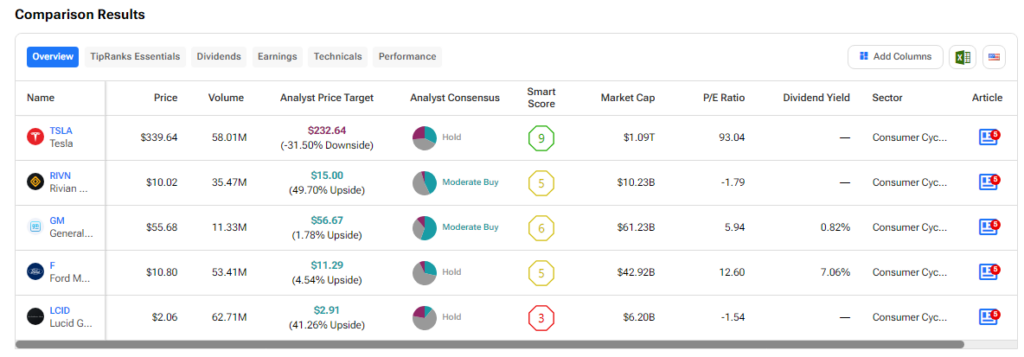As President-elect Trump talks of repealing EV tax credits, auto industry leaders are bracing for the potential repeal of the $7,500 federal tax credit for electric vehicles (EVs). The Biden administration introduced these tax credits for consumer vehicles as part of the Inflation Reduction Act (IRA) in 2022. Following the inception of the tax credits, EV sales surged, jumping 46% year-over-year to 1.19 million in 2023, according to Cox’s Kelley Blue Book.
Invest with Confidence:
- Follow TipRanks' Top Wall Street Analysts to uncover their success rate and average return.
- Join thousands of data-driven investors – Build your Smart Portfolio for personalized insights.
But if these tax credits are repealed, to what extent would EV sales decline? To quantify this effect, researchers Joseph Shapiro, Hunt Allcott, and Felix Tintelnot published a report titled “The Effects of ‘Buy American’: Electric Vehicles and the Inflation Reduction Act,” which was recently cited by Yahoo Finance.
EV Sales Could Fall If Tax Credits Are Repealed
The Yahoo Finance report stated, citing the simulation model run by these researchers, that repealing the tax credit would slash EV sales by 27%, reducing annual registrations to 867,000 vehicles—a loss of 317,000 units. Shapiro noted, “$7,500 is not trivial,” highlighting the substantial impact such a policy change could have on this rapidly growing market.
Different EV Subsidies for Different Vehicles?
However, Shapiro also suggested an alternative to uniform tax credits: differentiated subsidies for different vehicles. Elaborating further, Shapiro commented, “We’re giving the same $7,500 subsidy to most of those vehicles, and giving smaller subsidies to cars that have larger costs to society, larger externalities. That would make these subsidies more beneficial to society overall.”
Morgan Stanley Analyst Believes that EV Companies Could be Impacted
Meanwhile, Morgan Stanley analyst Adam Jonas foresees automakers like Tesla (TSLA), Rivian (RIVN), and Lucid (LCID) being particularly vulnerable. He believes that removing these tax credits would put “downward pressure” on car volumes. Jonas added that, to mitigate this impact, manufacturers may need to absorb the costs through discounts, potentially affecting profitability.
Are EV Stocks a Buy?
For investors interested in EV stocks, the TipRanks Stocks Comparison tool offers EV stocks that Wall Street analysts are cautiously optimistic about.










